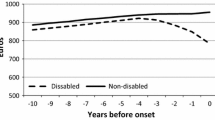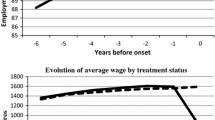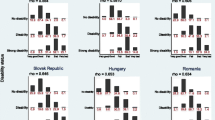Abstract
Using panel estimation on longitudinal data from the Panel Survey of Employment for the Disabled (PSED), this study examines the relationship between wages and job mismatch among disabled people in Korea. This paper uses a more detailed definition of job mismatch than utilized in earlier literature. This definition recognizes three forms of over-qualifications: over-educated only, over-skilled only, and a combination of both over-educated and over-skilled. Because earlier studies have only analyzed both over-education and over-skilling together for workers with disabilities they were thus subject to potential omitted variable problems. This analysis finds that there is a strong negative association between wages and all three kinds of over-qualification. In particular, workers with disabilities face a severe wage penalty when they are both over-educated and over-skilled. However, a causal relationship between wages and over-qualification is not evident after accounting for potential endogeneity problems and/or unobserved individual characteristics. This suggests that unobserved systematic differences play a substantial role in the determination of over-qualification effects on the wages of the disabled.
Similar content being viewed by others
Notes
Over-education is a concept based on the discrepancy between the highest level of education held by a worker and the education level required by his/her job tasks. A worker is defined as being over-educated in this setting if his/her education level is above the requirements of their job. Similarly, over-skilling typically refers to a worker whom possesses more skills than those required to carry out his/her job duties adequately.
The purpose of this Act is to strive for the promotion of employment and employment security of people with disabilities in Korea. The Ministry of Employment and Labor mandates that firms hire a certain percentage of people with disabilities: workers with disabilities should account for at least 2% of the staff for companies with more than 50 workers and 3% for central and local government. If firms don’t adhere to this quota then they have to pay a penalty. However, many firms still choose to pay the penalty rather than observe the quota.
A recent survey conducted by the Korea Institute for Health and Social Affair (KIHASA) under the supervision of the Ministry of Health and Welfare indicates that the employment-population ratio for those with a disability stood at 36.9% in 2017, much lower than the 61.3% ratio for people without a disability. The unemployment rate for people with disabilities was 5.1%, about 1.5 times higher than that of the general population (3.8%).
ORU is an abbreviation for Over-education (O), Required education (R), and Under-education (U).
For dummy variables, [e^(the coefficients of variables)-1] × 100 yields the percent change in wages.
The specification with a single dummy for over-qualification is a special case of the Verdugo and Verdugo model which includes both dummies for over-education and under-education.
For reasons of brevity, the estimated coefficients for the other control variables are broadly consistent with the previous literature and are only reported in Table 3.
References
Allen J, Van der Velden R (2001) Educational mismatches versus skill mismatches: effects on wages, job satisfaction, and on-the-job search. Oxf Econ Pap 53(3):434–452
Baldwin ML, Johnson WG (1995) Labor market discrimination against women with disabilities. Ind Relat 34(4):555–577
Bauer TK (2002) Educational mismatch and wages: a panel analysis. Econ Educ Rev 21(3):221–229
Becker GS (1964) Human capital: a theoretical and empirical analysis, with special reference to education. Columbia University Press, New York
Blazquez M, Malo M (2005) Educational mismatch and labour mobility of people with disabilities: the Spanish case. Rev Econ Lab 2(1):31–55
Chevalier A (2003) Measuring over-education. Economica 70(279):509–531
DeLeire T (2001) Changes in wages discrimination against people with disabilities: 1984-93. J Hum Resour 36(1):114–158
Di Pietro G, Urwin P (2006) Education and skills mismatch in the Italian graduate labour market. Appl Econ 38(1):79–93
Duncan G, Hoffman S (1981) The incidence and wage effects of over-education. Econ Educ Rev 1(1):75–86
Green F, McIntosh S, (2007) Is there a genuine under-utilization of skills amongst the over-qualified?. Applied Economics 39 (4):427-439
Freeman RB (1976) The overeducated American. Academic Press, New York
Green F, Zhu Y (2010) Overqualification, job dissatisfaction, and increasing dispersion in the returns to graduate education. Oxf Econ Pap 62(4):740–763
Groot W (1996) The incidence of, and returns to overeducation in the UK. Appl Econ 28(10):1345–1350
Groot W, Maassen van den Brink H (2000) Overeducation in the labor market: a meta-analysis. Econ Educ Rev 19(2):149–158
Hartog J (1980) Earnings and capability requirements. Rev Econ Stat 62(2):230–240
Hartog J (2000) Over-education and earnings: where are we, where should we go? Econ Educ Rev 19(2):131–147
Hausman JA (1978) Specification tests in econometrics. Econometrica 46(6):1251–1271
Jones MK, Latreille P, Sloan PJ (2006) Disability, gender and British labour market. Oxf Econ Pap 58(3):407–449
Jones MK, Mavromaras KG, Sloane PJ, Wei Z (2014) Disability, job mismatch, earnings and job satisfaction in Australia. Camb J Econ 38(5):1221–1246
Jones MK, Sloane PJ (2010) Disability and skill mismatch. Econ Rec 86(1):110–114
Leuven E, Oosterbeek H (2011) Over-education and mismatch in the labor market. IZA discussion paper 5523
McGuinness S (2006) Over-education in the labour market. J Econ Surv 20(3):387–418
McGuinness S, Wooden M (2009) Overskilling, job insecurity and career mobility. Ind Relat 48(2):265–286
Mavromaras KG, McGuinness S, O’Leary NC, Sloane PJ, Fok KY (2010) The problem of overskilling in Australia and Britain. Manch Sch 78(3):219–241
Mavromaras KG, McGuinness S, O’Leary NC, Sloane PJ, Wei Z (2013) Job mismatch and labour market outcomes: panel evidence on Australian university graduate. Econ Rec 89(286):382–395
Nicaise I (2001) Human capital, reservation wages and job competition: Heckman’s lambda reinterpreted. Appl Econ 33(3):309–315
Park K, Hazrul S (2015) Over-education and job mobility among young Korean female graduates. Asian Women 31(3):55–78
Park JY (2017) Disability discrimination in South Korea: routine and everyday aggressions toward disabled people. Disabil Soc 32(6):918–992
Rumberger RW (1987) The impact of surplus schooling on productivity and earnings. J Hum Resour 22(1):24–50
Sattinger M (1993) Assignment models of the distribution of earnings. J Econ Lit 31(2):831–880
Sicherman N (1991) Overeducation in the labor market. J Labor Econ 9(2):101–122
Tasi Y (2010) Returns to overeducation: a longitudinal analysis of the U.S. labor market. Econ Educ Rev 29(4):606–617
Verdugo RR, Verdugo NT (1989) The impact of surplus schooling on earnings: some additional findings. J Hum Resour 24(4):629–643
Wilkins R (2004) The effects of disability on labour force status in Australia. Aust Econ Rev 37(4):359–383
Author information
Authors and Affiliations
Corresponding author
Additional information
Publisher’s note
Springer Nature remains neutral with regard to jurisdictional claims in published maps and institutional affiliations.
About this article
Cite this article
Park, K. Qualifications, job mismatch, and workers with disabilities. Port Econ J 20, 161–180 (2021). https://doi.org/10.1007/s10258-019-00170-3
Received:
Accepted:
Published:
Issue Date:
DOI: https://doi.org/10.1007/s10258-019-00170-3




